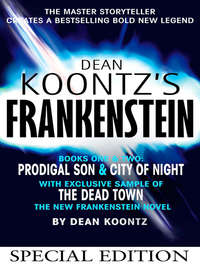
Полная версия
The Darkest Evening of the Year
She placed her slippers next to her bed, plumped her pillows, got under the covers—and discovered that Nickie had come to her. The golden had both slippers in her mouth.
This might have been a test of discipline or an invitation to play, although it did not feel like either. Even with a mouthful of footwear, Nickie managed a solemn look, and her gaze was intense.
“You want to bundle?” Amy asked.
At the word bundle, the other dogs raised their heads.
Most nights, Fred and Ethel slept contentedly in their corners. Occasionally, and not solely during thunderstorms, they preferred to snooze in a pile with Mom.
Even made anxious by thunder, they would not venture into Amy’s queen-size bed without permission, which was given with the phrase Let’s bundle.
Nickie did not know those words, but Fred and Ethel rose from their sheepskin berths in expectation of a formal invitation, ears raised, alert.
Wrung limp by recent events, Amy needed rest; and this would not be the first time that elusive sleep had come to her more easily when she nestled down in the security of the pack.
“Okay, kids,” she said. “Let’s bundle.”
Ethel sprinted three steps, sprang, and Fred followed. On the bed, assessing the comfort of the mattress, the dogs turned, turned, turned, like cogs in a clockworks, then curled, dropped, and settled with sighs of satisfaction.
Remaining bedside with a mouthful of slippers, Nickie stared expectantly at her new master.
“Give,” said Amy, and the golden obeyed, relinquishing her prize.
Amy put the slippers on the floor beside the bed.
Nickie picked them up and offered them again.
“You want me to go somewhere?” Amy asked.
The dog’s large dark-brown eyes were as expressive as those of any human being. Amy liked many things about the appearance of this breed, but nothing more than their beautiful eyes.
“You don’t need to go out. You pottied when we came home.”
The beauty of a retriever’s eyes is matched by the intelligence so evident in them. Sometimes, as now, dogs seemed intent upon conveying complex thoughts by an exertion of sheer will, striving to compensate for their lack of language with a directness of gaze and concentration.
“Give,” she said, and again Nickie obeyed.
Confident that repetition would impress upon the pooch that the slippers belonged where she put them, Amy leaned over the edge of the bed and returned them to the floor.
At once, Nickie snatched them up and offered them again.
“If this is a fashion judgment,” Amy said, “you’re wrong. These are lovely slippers, and I’m not getting rid of them.”
Chin on her paws, Ethel watched with interest. Chin on Ethel’s head, Fred watched from a higher elevation.
Like children, dogs want discipline and are most secure when they have rules to live by. The happiest dogs are those with gentle masters who quietly but firmly demand respect.
Nevertheless, in dog training as in war, the better part of valor can be discretion.
This time, when Amy took possession of the slippers, she tucked them under her pillows.
Nickie regarded this development with surprise and then grinned, perhaps in triumph.
“Don’t think for a second this means I’m going to be on the dog end of the leash.” She patted the mattress beside her. “Nickie, up.”
Either the retriever understood the command itself or the implication of the gesture. She sprang over Amy and onto the bed.
Fred took his chin off Ethel’s head, and Ethel closed her eyes, and as the other kids had done, Nickie wound herself down into a cozy sleeping posture.
All the mounded fur and the sweet faces inspired a smile, and Amy sighed as the dogs had done when they had settled for the night.
To ensure that the bungalow remained a hair-free zone, she combed and brushed each dog for thirty minutes every morning, for another ten minutes every evening, and she vacuumed all the floors once a day. Nickie would add to the work load—and be worth every minute of it.
When Amy switched off the lamp, she felt weightless, afloat on a rising sea of sleep, into which she began dreamily to sink.
She was hooked and reeled back by a line cast from the shores of memory: I have to wear slippers to bed so I won’t be walking barefoot through the woods in my dream.
Amy’s eyes opened from darkness to darkness, and for a moment she could not breathe, as if the past were a drowning flood that filled her throat and lungs.
No. The game with the slippers could not have been for the purpose of reminding her of that long-ago conversation about dream-walking in the woods.
This new dog was just a dog, nothing more. In the storms of this world, a way forward can always be found, but there is no way back either to a time of peace or to a time of tempest.
To the observant, all dogs have an air of mystery, an inner life deeper than science will concede, but whatever the true nature of their minds or the condition of their souls, they are limited to the wisdom of their kind, and each is shaped by the experiences of its one life.
Nevertheless, the slippers now under her pillow reminded her of another pair of slippers, and the recollected words replayed in her mind: I have to wear slippers to bed so I won’t be walking barefoot through the woods in my dream.
Ethel had begun to snore softly. Fred was a quiet sleeper except when he dreamed of chasing or of being chased.
The longer Amy lay listening for Nickie’s rhythmic breathing, the more she began to suspect that the dog was awake, and not just awake but also watching her in the dark.
Although Amy’s weariness did not abate, the possibility of sleep receded from her.
At last, unable to stifle her curiosity any longer, she reached out to where the dog was curled, expecting that her suspicion would not be confirmed, that Nickie would be fully settled.
Instead, in the gloom, her hand found the burly head, which was in fact raised and turned toward her, as if the dog were a sentinel on duty.
Holding its left ear, she gently massaged the tragus with her thumb, while her fingertips rubbed the back of the ear where it met the skull. If anything would cause a dog to purr like a cat, this was it, and Nickie submitted to the attention with palpable pleasure.
After a while, the golden lowered her head, resting her chin on Amy’s abdomen.
I have to wear slippers to bed so I won’t be walking barefoot through the woods in my dream.
In self-defense, Amy had long ago raised the drawbridge between these memories and her heart, but now they swam across the moat.
If it’s just a dream woods, why wouldn’t the ground be soft?
It’s soft but it’s cold.
It’s a winter woods, is it?
Uh-huh. Lots of snow.
So dream yourself a summer woods.
I like the snow.
Then maybe you should wear boots to bed.
Maybe I should.
And thick woolen socks and long johns.
As Amy’s heart began to race, she tried to shut out the voices in her mind. But her heart pounded like a fist on a door: memory demanding an audience.
She petted the furry head resting on her abdomen and, as defense against memories too terrible to revisit, she instead summoned into mind the many dogs that she had rescued, the abused and abandoned dogs, hundreds over the years. Victims of human indifference, of human cruelty, they had been physically and emotionally broken when they came to her, but so often they had been restored in body and mind, made jubilant again, brought back to golden glory.
She lived for the dogs.
In the dark she murmured lines from a poem by Robert Frost, which in grim times had sustained her: “‘The woods are lovely, dark, and deep. But I have promises to keep. And miles to go before I sleep. And miles to go before I sleep.’”
Head resting on Amy’s abdomen, Nickie dozed.
Now Amy Redwing, not this mysterious dog, was the sentinel on duty. Gradually her heart stopped pounding, stopped racing, and all was still and dark and as it should be.
Chapter 14
At the windows, dawn descended, pressing darkness down and westward, and away.
Traffic noise began to arise from the street, the wheels of commerce and occasionally a far voice.
On the kitchen table lay the drawing of Nickie and two studies, from memory, of her eyes. The second study included less surrounding facial structure than the first.
Brian had begun a third study. This one involved only the eyes in their deep sockets, the space between, the expressive eyebrows, and the lush lashes.
He continued to be enchanted by the task that he had set for himself. He also remained convinced that he had seen something in the dog’s gaze that was of great importance, an ineffable quality that words could not describe but that his inexplicably enhanced talent, his seemingly possessed drawing hand, might be able to dredge from his subconscious and capture in an image, capture and define.
The irrationality of this conviction was not lost on him. An ineffable quality is, by its nature, one that can’t be defined, only felt.
His determination to draw and redraw the dog’s eyes, until he found what he sought, was nothing less than a compulsion. The extreme mental focus and the emotional intensity that he brought to the task perplexed him, even worried him—though not sufficiently to make him put down the pencil.
In Rembrandt’s famous Lady with a Pink, the subject doesn’t communicate directly with the viewer but is portrayed in a reverie that makes you want to enter her contemplation and understand the object of it. The artist gives her nearer eye a heightened color contrast, a clear iris, and a perfectly inserted highlight that suggests a mind, behind the eye, that is no stranger to profound feeling.
Brian had no illusions that his talent approached Rembrandt’s. The subtlety of the translucent shadows and luminous refractions in this latest version of the dog’s eyes was so far superior to the quality of anything he’d drawn before, both in concept and execution, that he wondered how he could have created it.
He half doubted that the drawing was his.
Although he was the only presence in the apartment, although he had watched the series of pencils in his hand produce the image, he became increasingly convinced that he did not possess the genius or the artistry required to lay down upon paper the startling dimension or the luminous mystery that now informed these finished eyes.
In his thirty-four years, he had no slightest experience of the supernatural, nor any interest in it. As an architect, he believed in line and light, in form and function, in the beauty of things built to last.
As he tore the most recent drawing from the tablet and put it aside, however, he could not dismiss the uncanny feeling that the talent on display here was not his own.
Perhaps this was what psychologists called a flow state, what professional athletes referred to as being in the zone, a moment of transcendence when the mind raises no barriers of self-doubt and therefore allows a talent to be expressed more fully than has ever been possible previously.
The problem with that explanation was, he didn’t feel in full control, whereas in a flow state, you were supposed to experience absolute mastery of your gifts.
In front of him, the blank page in the tablet insisted on his attention.
Go even closer on the eyes this time, he thought. Go all the way into the eyes.
First, he needed a break. He put down the pencil—but at once picked it up, without even pausing to stretch and flex his fingers, as if his hand had a will of its own.
Almost as though observing from a distance, he watched himself use the X-acto knife to carve away the wood and point the pencil.
After he sharpened a variety of leads, to give them typical points, blunt points, and chisel points, and after he finished each on a block of sandpaper, he put the last pencil and the knife aside.
He pushed his chair back from the table, got up, and went to the kitchen sink to splash cold water in his face.
As he reached for the faucet handle, he realized that he had a pencil in his right hand.
He glanced at the table. The pencil that he thought he had left beside the art tablet was not there.
Before Amy had called him to assist on the rescue mission, he’d had only an hour’s sleep. Weariness explained his current state of mind, these small confusions.
He put the pencil on the cutting board beside the sink and stared at it for a moment, as if expecting it to rise on point and doodle its way back to him.
After repeatedly immersing his face in double handfuls of cold water, he dried off with paper towels, yawned, rubbed his beard stubble with one hand, and then stretched luxuriously.
He needed caffeine. In the refrigerator were cans of Red Bull, which he kept on hand for those design deadlines that sometimes required him to pull an all-nighter.
The pencil was not clutched in his right hand when he opened the refrigerator door. It was in his left.
“Weariness, my ass.”
He put the pencil on a glass shelf in the refrigerator, in front of a Tupperware container full of leftover pesto pasta.
After popping the tab on a Red Bull and taking a long swallow, he closed the fridge without retrieving the pencil. He clearly saw it on the shelf in front of the pesto pasta as the door swung shut.
When he returned to the table and put down the Red Bull, he realized that the pocket of his Hawaiian shirt contained a pencil.
This had to be a different pencil from the one in the fridge. It must have been in the pocket since he’d risen from the table to wash his face.
He counted the pencils on the table. Two should be missing: the one in his pocket, the one in the fridge. But he was short only one.
Disbelieving, he returned to the refrigerator. The pencil that he had left on the shelf in front of the Tupperware container was no longer there.
Now you see it. Now you don’t.
Sitting at the table again, Brian took the pencil from his shirt pocket. With flourishes and a nimbleness akin to prestidigitation, his fingers manipulated the instrument into the proper drawing grip.
He had not consciously intended to play with the pencil in that fashion. His fingers appeared to be expressing a memory of diligent practice from a previous life when he had been a magician.
The point touched the paper, and graphite seemed to flow almost as swiftly as a liquid, pouring forth the enigmas of luminous flux and translucent veils in the dog’s far-seeing eye.
He gave less thought to what he would draw, then less, then none at all. Independent of him, his inspired hand swiftly shaped shadows and suggested light.
On the nape of his neck, the fine hairs rose, but he was neither frightened nor even apprehensive. A quiet amazement had overtaken him.
As he had half suspected—and now knew beyond doubt—he could not claim to be the artist here. He was as much an instrument as was the pencil that he held. The artist remained unknown.
Chapter 15
After a few hours of sleep, Amy woke at 7:30, showered, dressed, served three bowls of kibble, and took the kids for a morning walk.
Three big dogs could have been a test of Amy’s control and balance. Fortunately, Nickie seemed to have received good training. Each time Amy dropped the leashes to blue-bag the poop, Nickie respected a sit-and-stay command as reliably as did Fred and Ethel.
The pleasantly warm morning was freshened by a breeze as light as a caress, and the feathery fronds of queen palms cast shadows that resembled the plumed tails of the goldens.
Having overslept, Amy brushed all three dogs in just one hour. They lay as limp as citizens of leisure being pampered at a spa. She spent more time on Nickie than on the other two, but found no ticks.
By 9:40, the four of them were aboard the Expedition, outbound from Laguna Beach on an adventure.
They stopped first to see Dr. Sarkissian, one of a network of veterinarians who treated rescue dogs at a discount until they were placed in forever homes.
After an examination, Harry Sarkissian gave Nickie a full array of inoculations. He put her on medication to control fleas, ticks, and heartworm. Results of a blood workup would come back in two days.
“But there’s nothing wrong with this girl,” he predicted. “She’s a beauty.”
With Nickie, Amy returned to the Expedition, where Fred and Ethel sulked briefly. They knew a visit to the vet always included a cookie. Besides, they could smell it on their sister’s breath.

Renata Hammersmith lived inland, where pockets of horse country still survived the relentless march of southern California suburbs.
She dressed so reliably in boots, jeans, and checkered shirts that it was easy for Amy to believe that the woman slept in a similar outfit, impossible to imagine her in pajamas or peignoir.
Surrounded by white ranch fencing, her three-acre property once featured horses grazing in a meadow that served as the front yard.
The horses became a luxury when Jerry, Renata’s husband, was disabled. His beloved 1967 Ford Mustang was hit head-on by a pickup.
Paralyzed from the waist down, Jerry had also lost his spleen, a kidney, and a significant portion of his colon.
“But I’m still full of shit,” he assured friends.
He had not lost his sense of humor.
Drunk, unemployed, and uninsured, the driver of the pickup had walked away from the collision with two broken teeth, an abrasion, and no remorse.
Six years ago, the Hammersmiths sold Jerry’s construction business, banked the capital gains, cut expenses, and hoped to make the money stretch the rest of their lives. They were now fifty-two.
Because Renata could not look after Jerry and hold a job, she feared having to sell their land one day. She had lived always with elbow room. The thought of having neighbors a wall away chilled her.
Amy drove past the ranch house, where thriving red clematis festooned the veranda roof and the posts that supported it. With a cell-phone call en route, she had learned that Renata was working with the ghost dogs in the exercise yard.
The kennel, converted from a stable, adjoined a fenced green lawn. An immense California live oak shaded half the grass.
Six golden retrievers were sitting or lying at separate points in the big exercise yard, most of them in the shade. Renata sat on a blanket in the center of the space, a seventh golden at her side.
As Amy opened the tailgate and let her kids out of the SUV, she looked back the way she had come, past the house, to the county road.
On the farther side of the two-lane blacktop, opposite the entrance to the Hammersmith property, parked in the purple shadows cast by a small grove of jacarandas, stood the Land Rover that had been following her all morning.
When she opened the gate to the exercise yard, Fred and Ethel led Nickie directly to Renata, to receive the affection they knew she would bestow, and to greet Hugo, the golden at her side.
As Amy arrived amidst the slow swarm of four socializing dogs, Renata held up to her the binoculars that she had asked for on the phone.
With them, Amy looked back toward the distant jacarandas and adjusted the focus, pulling the Land Rover toward her.
The trees spilled a currency of shadows and a few coins of light across the windshield, conspiring to obscure the face of the man— if it was a man—who sat behind the wheel.
“Is it the wife-beater?” Renata asked.
“Can’t tell. Probably not. I don’t think he could have been sprung from jail this quick.”
Конец ознакомительного фрагмента.
Текст предоставлен ООО «ЛитРес».
Прочитайте эту книгу целиком, купив полную легальную версию на ЛитРес.
Безопасно оплатить книгу можно банковской картой Visa, MasterCard, Maestro, со счета мобильного телефона, с платежного терминала, в салоне МТС или Связной, через PayPal, WebMoney, Яндекс.Деньги, QIWI Кошелек, бонусными картами или другим удобным Вам способом.







